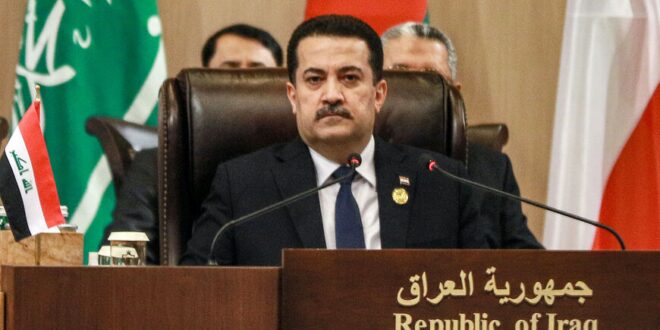Local militias have resumed threatening the US presence in Iraq this week, leaving Prime Minister Muhammad Shia al-Sudani in a difficult position.
Sudani was nominated by the Coordination Framework, a bloc that includes Iran-backed militant groups and allied political groups. The alliance provides essential political support to Sudani who relies on them to stay in the office.
On the anniversary of the killing of Iran’s Quds Force commander Qassem Soleimani and Iraqi commander Abu Mahdi al-Muhandis on Tuesday, Qais Khazali, the head of the Iran-backed militant group Asa’ib Ahl al-Haq, called for punishing the United States for its role in the killing of the two leaders.
“The United States of America is the one that bears the responsibility for the blood of the martyrs, and it is the one that must be punished,” Khazali said. Adding that former US President Donald Trump must “pay the price” for ordering the strikes.
Head of Kataib Hezbollah Abu Hussein al-Hamidawi also issued a statement on the occasion, threatening to expel US forces not just from Iraq but from the entirety of west Asia.
Hamidawi also threatened Saudi Arabia together with the United States and Israel, saying their presence would be demolished by the resistance movement in the region.
“And you Americans and the Saudi and Zionist entities have to understand that this nation has risen up and learned its lesson well, and that your malicious methods will no longer benefit you. … Your thrones are demolished, your walls are flimsy,” Hamidawi said.
This anti-US rhetoric comes at a time when Sudani has been trying to maintain a good relationship with the United States and Saudi Arabia and garner regional and international support for his government.
Threats aimed at Washington and Riyadh by the militias who are among the political parliamentary bloc supporting Sudani will of course leave him in a difficult situation, especially as Iraq is witnessing an economic crisis amid a falling Iraqi dinar and as Baghdad is trying to mediate between Iran and Saudi Arabia.
Other militant groups that are outside of the Coordination Framework but allied with them in opposing the US and Saudi Arabia in the region also threatened to continue armed attacks against them. Al-Nujaba Movement and Ahrar al-Iraq are the most prominent.
The differences between the Coordination Framework and Sudani are expanding to other areas as Sudani tries to make sensitive decisions independently from the Coordination Framework.
Sudani had resisted calls by the State of Law coalition, led by the former Prime Minister Nouri al-Maliki, to modify the exchange rate and reduce the value of the US dollar against the Iraqi dinar. Maliki controls about 40 seats among the Coordination Framework parliamentary group.
Sudani also has been trying to keep sensitive security positions under his control and away from the Coordination Framework’s influence in an effort to prevent militant groups within the Coordination Framework from establishing and expanding their influence.
Sudani had kept the intelligence services under his own control, knowing that any influence from militant groups could prompt US objections. Ahmad al-Sudani, a member of Sudani tribe recently appointed to manage the office of the head of the intelligence services is now leading the entire service.
Iraq’s border crossings are now under the control of another relative of the prime minister, Maj. Gen. Sami Al-Sudani.
Lt. Gen. Abdul Karim al-Sudani has also been appointed as secretary to the commander-in-chief of the armed forces, raising concern among Coordination Framework members who claim Sudani is trying to dominate sensitive posts via his family members’ influence.
Qais al-Khazali had claimed previously that the Coordination Framework reached an agreement with Sudani whereby he wouldn’t make any important decisions without consulting the group.
A source within the Coordination Framework told Al-Monitor on condition of anonymity that Sudani had not attended the last meeting of the Coordination Framework held Jan. 1, the first one he has missed.
At the same time, several Iraqi local medias reported that the opposition against Sudani is growing among the Coordination Framework and some the groups among the Coordination Framework are threatening to withdrew confidence from him.
 Eurasia Press & News
Eurasia Press & News



